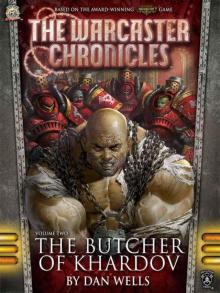Isolation Read online
Page 3
PARAGEN BIOSYNTH GROWTH AND TRAINING FACILITY, UNDISCLOSED LOCATION
January 31, 2059
“Your accuracy is improving,” said Latimer. He was her private instructor in firearms and infiltration, running her through trial after trial, race after race, a kind of shadow biathlon: running and shooting without ever being seen. Heron knew that her accuracy was more than just “improving”—it was better than his now. Accuracy was the least of her accomplishments. She could cross the entire course, ten square miles of rugged northern forest, without once being tagged by the guard drones or autoturrets, and she hadn’t failed an assassination in ten straight days. His praise was rare, and she was grateful when she got it, but to mention only her “accuracy,” and with the faint praise that it was “improving,” was practically an insult.
“Thank you,” said Heron. “You’re too kind.”
“It’s time to start you on a new course,” said Latimer, gesturing for her to follow him. She was still calming down from the last time trial, her breathing and heart rate slowly decelerating, but she kept her recovery internal, showing no signs of weakness as she followed him across the room. He gestured to a chair, and as she sat he waved at a holovid projector, waking it up with a swipe. A single title icon appeared in the center of the room—she was never allowed to see more than was strictly necessary—and he grabbed it. The holovid blinked, and suddenly the room was filled with people, frozen in place: men and women, many of them in uniform. It was not a uniform she recognized. The women in the room looked like Heron—the same black hair, the same unique eye shape, the same basic bone structure and skin. The men, on reflection, were similar as well. Heron had only ever seen that look on herself and the other espionage girls and made the immediate assumption that this was a room full of Theta-model Partials, but she discarded the idea almost immediately. The people were too varied in age and height to be Partials; it was more likely that these were humans, from the group the Thetas had been designed to look like. “They’re Chinese,” she said. “That’s the Chinese military uniform, which means . . .” She scanned the room, analyzing their positions and attitudes, and finally pointed at a short, balding man. “He’s the leader, and the man beside him is his second in command, and the three behind him are bodyguards. Is this who we’re fighting?”
Latimer cocked his head. “I hadn’t realized you’d seen the vid already.”
“I haven’t,” said Heron. “It just seems obvious.”
“‘Obvious,’” Latimer repeated, a slight smile on his face. “How much do you know about the Isolation War?”
“That’s the war we’re being trained for.”
“And?”
“That’s all.”
“‘Obvious,’” said Latimer again. “You’ve never seen a Chinese person in your life, you know nothing about the nature of the war, and yet from a single static image you intuit who they are and how you’re connected to them. You have a gift for observation.”
“Thank you,” she said again.
“The Isolation War,” said Latimer, “is their fault—not theirs alone, by any means, but they’re the ones we’re fighting right now, so it may as well be. If they’d just given us what we wanted, no one would be fighting anyone.”
“What do we want?” asked Heron. The instructors had been very tight-lipped thus far about the nature of the war—about the nature of the entire world, for that matter. She knew the training facility like the back of her hand, but virtually nothing of what lay beyond. If he was in the mood to talk about it, she intended to learn everything she could.
“We want what everybody wants,” said Latimer. “Natural resources. In this case, resources are literally what everybody wants, and there’s not enough to go around. Let’s back up a bit to give you the full context: The most valuable resource in the world is energy, and energy traditionally comes from oil, which traditionally comes from here.” He waved his hand and the people disappeared, replaced by a menu Heron hadn’t seen before. She had just enough time to read the folder names before he chose one and the list disappeared: Australia, Images, Indonesia, Japan, Maps, NADI, Russia, and Theta. He chose “Maps” and selected a world map. It filled the room in gently glowing 3-D.
“Here,” he said, pointing at a yellow patch at the junction of two landmasses. “This is called the Middle East.”
Heron had never seen a world map before and drank in the new information hungrily. “Why is it called the Middle East?”
“It doesn’t matter,” said Latimer. “It’s all gone now—one of those little countries attacked another one with a nuclear device and wiped the entire region clean. No people, no buildings, no oil. There’s oil all over the world, really, but the Middle East was like a convenience store; when it closed shop, the world freaked out. Something we needed to survive was gone forever, in the blink of an eye. The next few months was a game of Hungry Hungry Hippos, with every nation scrambling to grab as much of what was left as it possibly could: Russia grabbed Norway, Brazil grabbed Venezuela—none of these names mean anything to you, and you’ll learn the details later, but suffice it to say that the world’s political powers became very suddenly and selfishly concerned with ‘having enough,’ which almost immediately translated to ‘having more than anyone else.’ China was arguably the greediest, and invaded Russia at its earliest opportunity. Once they had that taken care of, they turned their eyes to us.”
Heron studied the map. “Where are we?”
“Here,” said Latimer, stepping forward and gesturing to the Western Hemisphere. “America and Canada had their oil reserves up here, in the north, and plenty of other resources as well, uncomfortably close to China and their new holdings in Russia, which made a landgrab almost inevitable. And we don’t take kindly to grabby strangers.”
The map was faintly labeled, and she saw that the area he was describing was collectively known as North America. She looked down at her uniform, and the patch above the left breast pocket: NADI. “That’s what this stands for, isn’t it? North American . . . Department . . .”
“North American Defense Initiative,” said Latimer. “NADI is a military alliance, formed to keep the Chinese off our lawn.”
“So we’re defending against an invasion?”
“Actually, China is. NADI worked so well as a deterrent that China decided its best course of action was to turtle—tuck its head down, hold on to everything it had, and ride it out. With so much of Russia and Southeast Asia already under their control, they had a wildly disproportionate chunk of the world’s resources, so they didn’t really need to waste any of it trying to get ours. They closed off all foreign trade, all international relations, all everything. They don’t buy our stuff, and most importantly, they don’t sell theirs to us.”
“The Isolation War,” said Heron, putting the pieces together. “They want to stay isolated, but we can’t survive if they do.”
“Like I said,” said Latimer, “you have a gift for observation. Let’s go back to the embassy.” He waved, and the map dissolved instantly into the roomful of Chinese people from before. He waved again and the image leapt into motion, the people moving back and forth, in and out of the edges, talking and smiling and shaking hands. They were speaking Chinese, and Heron was delighted to find that she could understand them perfectly: small talk and random pleasantries, just like she’d learned in class. It gratified her to know that she was actually using the seemingly useless phrases they’d been teaching her for months.
“The short man you pegged as the leader is General Wu Po Shu; pay close attention, because he’s your target.”
Heron thought back to the training she’d been doing: stealth, infiltration, and attack. “You want me to kill him?”
“Not at first,” said Latimer, “though it might eventually come to that. Tell me, Heron, do you know what ‘espionage’ means?”
“Ms. Spinney says it’s about gathering information,” said Heron, “but so far all you’ve taught me to do is sneak in an
d out of somewhere, so I assume it’s focused on gathering information you’re not supposed to have.”
Latimer laughed. “We’re the US government,” he said. “There is no information we’re not supposed to have. Think of it instead as ‘gathering information from people who don’t want to give it to you.’ In your case, that’s General Wu.”
“So I sneak in and steal his computer,” said Heron, “or his phone.”
“If all goes well, he’ll hand you his computer and ask you to help him hide his secrets on it. This is not an in-and-out mission, Heron; this is long-term. I assume you noticed the physical similarities between you and Wu’s party here?”
“I look Chinese,” said Heron, nodding. “The espionage models are the only ones who do; plus we’re the only ones who speak the language.”
“Not the only ones, but yes, that’s the idea.”
It seemed clear now that she thought of it. “You want me to live with them, and pretend to be one of them, and report back to you on a regular basis about what they’re doing and how they’re doing it.”
“Exactly,” said Latimer. He pulled a small card from his pocket and threw it to her; it was an ID card, all written in Chinese, with her picture in the corner. “Your name will be Mei Hao. If you do your job right, we can place you as highly as Wu’s personal staff—we’ll get you in the right place with the right papers and then arrange a job opening with a high-powered rifle. With you on the inside, we’ll know everything we need to know about that part of the war: where the defenses are, how strong they are, where the supply lines run, and so on. With that kind of information, we can arrange something far more valuable than a quick assassination.” He gestured at the holovid, and a class menu popped up. “We’re starting you today on a new course of study: cultural classes, advanced linguistics classes, interrogation, surveillance—the whole super-combo meal. Master this and you’ll be able to blend in like a native and gain the trust of anyone in China.”
“And then kill them,” said Heron.
“If necessary, yes,” said Latimer. “Does that bother you?”
Heron cocked her head, confused. “Should it?”
Latimer smiled. “Absolutely not.”
ZUOQUAN CITY, SHANXI PROVINCE, CHINA
June 9, 2060
Heron hurried down the stairs and out into the courtyard, flashing her general’s retinue colors to anyone who looked like they might try to stop her. The antiair guns were on the roof of Building 2, the highest of the factory buildings, with a clear view of the surrounding skyline. She considered a frontal assault, but discarded the idea almost immediately—she was armed only with a sidearm, and a low-caliber one at that. Besides, her orders were odd enough that she wanted to keep her options as open as possible. A frontal assault, even if she succeeded, could leave her wounded, or worse, outed as an enemy agent. She stepped through the doorway of Building 2, which was still swarming with workers in the twenty-four-hour factory, and walked purposefully past them to the elevator. Seduction was always an option, and she had been engineered with exceptional beauty for that very purpose, but on the roof there would be too many. A four-man crew for each of the four gun emplacements, plus guards. The elevator arrived and she stepped in, half smiling at the challenge. Can I actually do it? Twenty men, give or take. But then again, I don’t have to distract them all at once, do I?
She smiled again, taking off her jacket to expose the blouse beneath—it was army issue, and fairly plain, but adjusted properly, it showed a fair amount of cleavage. She pulled her hair out of its tight bun and shook it loose, running her fingers through it to give it body. She hiked up her skirt to show a little thigh, and waited as the elevator rose slowly to the top. On the top floor she screwed a silencer onto the end of her gun, hid it in her jacket and threw it over her arm as she exited the elevator and walked up the stairs to the roof. The cannons were laid out in a line, and she walked slowly toward the farthest one, letting all the soldiers watch appreciatively as she passed.
As always, Heron was fascinated by the men’s reaction to her. She felt removed from their attention, as if they were watching not her but a character she had created, and through her creations she could manipulate their every action. A certain walk and their pulse would quicken; a smile, a bit of eye contact, and their entire attitudes would change. Some wanted to protect her, like General Bao; others wanted to talk to her, to learn who she was; and still others wanted simply to touch her. All these reactions, and more, were a form of control—they saw something pretty and wanted it for themselves. How many of them suspected that she was the one controlling them?
The antiair guns were set up on turrets, able to turn in any direction and track their heavy double cannons up and down in a huge range of fire. They had a blind spot directly overhead, where the turret couldn’t rotate quite far enough, but the other guns could cover one another as needed. Heron reached the last one in the line and smiled at the four-man crew, not seductively but innocently. For a long-term seduction you needed wit and intelligence, but for something quick and dirty there was nothing even half as effective as gorgeous naïveté.
“Hey, boys.” She lifted a flap of her jacket, showing the general’s symbol. “Wu asked me to come check on the artillery, but I’m afraid I don’t know anything about it.”
The men stared, uncertain how to react. The two youngest were smiling like idiots in the back, and Heron favored them with a mischievous smile. The leader of the crew asked what she needed to know, and she ran her hand along the cannon’s thick metal barrel. “Does it really take all four of you to fire it?” They laughed and shook their heads, explaining in broad terms their individual jobs: one man spotted, one man aimed and fired, and the two youngest kept the gun well fed with ammo. She cooed over each new revelation, bending over and laughing and generally making a fool of herself, and the men responded in kind, treating her more and more like an idiot but telling her, and giving her, anything she wanted. After all, what could an idiot do to hurt them?
She bent low at the waist, pointing to something in the gun’s turret system and preparing to ask a question, when suddenly an artillery shell struck the civilian building to the east. She straightened slowly, glancing at her watch: 2220. That can’t be the invasion.
“That wasn’t ours,” said one of the gunners. They wandered to the railing, shocked, and looked down at the city beyond the complex walls. Two more artillery shells landed, destroying the buildings that stood in the path of the Partial advance. They were coming now.
They were coming early.
Heron straightened up, pulling her gun from the folds of her jacket. “Sorry, boys.” One of them managed to turn around, his eyes wide with shock and confusion; she shot him in the chest and the other three in the back, her silenced pistol making no more noise than a staple gun. Their rifles were leaning against the wall nearby, and she picked one up, checked the chamber, and turned to take aim on the nearest guard. He was looking toward her, diligently concerned with the noises on his roof instead of the spectacle across the way. She dropped him at range with two shots from the rifle, deafening reports that even the distracted soldiers on the other cannons couldn’t ignore. They turned to see what had happened, but Heron was already climbing into the first antiaircraft turret. The crew had glossed over the nitty-gritty details of its operation, but she’d been trained on one of these when she was four months old. A simple joystick steered the thing, and she swung the gun around, not toward the sky but toward the next turret in line. A control pad on her right activated the smart rounds, but she didn’t need them for a stationary target barely twenty yards away. She jammed down the fire button and the entire turret shuddered, the twin barrels thudding in and out as the cannon roared and the turret next to hers exploded in a hail of fire. She kept her finger firm on the trigger, watching dispassionately as the rounds hammered into the cannon, piercing its armor, destroying its insides, and then punching through and flying on toward the next turret, destroying that one
in a similar storm of shrieking metal. She ran out of bullets before destroying the final cannon, having no crew to keep her loaded, and jumped out with her stolen rifle. The rooftop was a chaos of smoke and fire, and she ran down the line toward the last target, shooting as she went the three shell-shocked soldiers who’d managed to survive her initial onslaught.
But the last turret was unscathed, and apparently still manned. Its turret swung around and fired back toward her, destroying what was left of the two guns in the middle as well as the turret she had just fired, and Heron dove for cover behind the remains of the third turret. The sound was deafening, and though she covered her ears to protect them, she still felt each shot rippling through the air and numbing her entire body. When the cannon stopped, she felt as shell-shocked as the other soldiers had, and she closed her eyes to calm herself, willing her body to overcome the effects. The world was eerily silent, all sounds replaced by a distant tone that faded in and out. She gritted her teeth, grabbed her rifle, and peeked around the remains of the smoking gun turret. A bullet ricocheted inches from her face, and she ducked back behind. A guard popped up in front of her, and she shot him in a single motion: raising her rifle, sighting along it, and pulling the trigger before lowering the gun back down to her lap. How many more guards were up here? How many soldiers were shooting from the final turret, and how many were tending it?
She peeked around again, and again their rifles lit up with muzzle flashes: two shooters, with one manning the cannon and one feeding it ammo. She still couldn’t hear anything. She was presumably safe from the cannon itself, because aiming it low enough to hit her meant putting holes in the roof, and the building was too flimsy to withstand that. Another guard popped up from behind an air-conditioning unit, and she dropped him almost without thinking. If she could see them, she could kill them, but they had her so completely pinned down that she couldn’t see anything near the final turret. She needed a distraction; she reached for her jacket, but it was long gone back by the first turret. She pulled off a nearby soldier’s jacket instead, holding it in her left hand and her rifle in her right. Time to see who has better reflexes.

 Partials
Partials The Devil's Only Friend
The Devil's Only Friend Isolation
Isolation I Don't Want to Kill You
I Don't Want to Kill You Ones and Zeroes
Ones and Zeroes Next of Kin
Next of Kin Over Your Dead Body
Over Your Dead Body Fragments
Fragments Mr. Monster
Mr. Monster The Butcher of Khardov
The Butcher of Khardov I AM NO T A S E RI AL KI L L E R
I AM NO T A S E RI AL KI L L E R Nothing Left to Lose--A Novel
Nothing Left to Lose--A Novel Active Memory
Active Memory A Pear-Shaped Funeral
A Pear-Shaped Funeral I Am Not a Serial Killer
I Am Not a Serial Killer Bluescreen
Bluescreen Ruins
Ruins Zero G
Zero G The Hollow City
The Hollow City Extreme Makeover
Extreme Makeover Partials p-1
Partials p-1 The Complete John Wayne Cleaver Series: I Am Not a Serial Killer, Mr. Monster, I Don't Want to Kill You, Devil's Only Friend, Over Your Dead Body, Nothing Left to Lose
The Complete John Wayne Cleaver Series: I Am Not a Serial Killer, Mr. Monster, I Don't Want to Kill You, Devil's Only Friend, Over Your Dead Body, Nothing Left to Lose